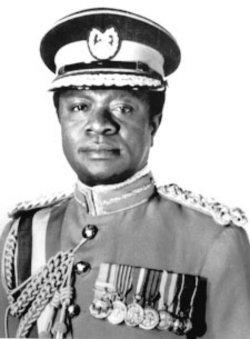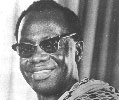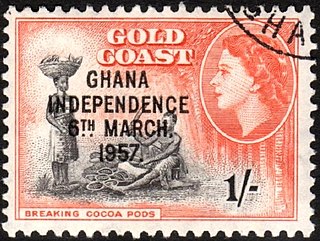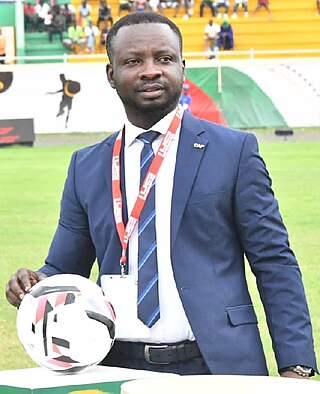Related Research Articles
Ignatius is a male given name and a surname. Notable people with the name include:

Ignatius Kutu Acheampong was a Ghanaian military officer and politician who was the military head of state of Ghana from 13 January 1972 to 5 July 1978, when he was deposed in a palace coup. He was executed by firing squad on 16 June 1979.

The Ashanti Region is located in the southern part of Ghana and is the third largest of 16 administrative regions, occupying a total land surface of 24,389 km2 (9,417 sq mi) and making up 10.2 percent of the total land area of Ghana. It is the most populated region in Ghana, with a population of 5,440,463 according to the 2021 census, accounting for around one-sixth of Ghana's total population. The Ashanti Region is known for its gold bar and cocoa production. The largest city and capital of Ashanti is Kumasi.

Kofi Abrefa Busia was a Ghanaian political leader and academic who was Prime Minister of Ghana from 1969 to 1972. As a leader and prime minister, he helped to restore civilian government to the country following military rule. He declared support for apartheid South Africa's white minority government.
Kofi is an Akan masculine given name among the Akan people in Ghana that is given to a boy born on Friday. Traditionally in Ghana, a child would receive their Akan day name during their Outdooring, eight days after birth.
Asamoah is a prominent last name of the Akan tribe in West Africa, primarily located in Ghana. It is derived from "Asomafo" in the twi (chwee) language, meaning "apostles." In Twi, "Asoma" is the verb "to send" and "fo" means people, so the literal translation is "sent people." The family name grew with the rise of Christianity in the *Ashanti Empire and later Gold Coast which are the forerunners to modern Ghana. It is originally pronounced with three syllables "a-sah-muah" but the lack of the twi vowel "ɔ" in many scripts has led to the four syllable pronunciation "a-sa-mo-ah" in western culture.
Adjei, Agyei, Ajai, Aja yi and other variety of spelling is a global common surname among people from Ghana and other African countries, India, other Asian countries, and Europe. It means "Agya" (Fire in the sky-Suns. There are other suns in the sky other than our own. "Yi" has many meaning, but in this instance, it means "This, that, and those." Agya yi This sun or suns, but usually referred to God. The author is a Ghanaian, Asanti, with advanced degrees now based in USA. Notable people with the surname include:

Ghana gained independence from the British on 6 March 1957. It is a member of the Commonwealth of Nations. The country became a republic on July 1, 1960.
Addai or Addae is a surname of Ashanti origin. Notable people with this surname include:
Poku is a surname. Notable people with the surname include:
Abena is an Indian (Gujarati) surname; the Gujarati અબેના (Abēnā) possibly came from the Arabic name أبين (Abyan). As a given name, it is a girl's name of Ghanaian origin and means born on Tuesday. Day names are a cultural practice of the Akan people of Ghana. Although some might believe it is mostly practised by Ashanti people, it is actually practised by all Akan people who follow traditional customs. People born on particular days are supposed to exhibit the characteristics or attributes and philosophy, associated with the days. Abena has the appellation Kosia or Nimo, meaning friendliness. Thus, females named Abena are supposed to be friendly.
Gustav Koranteng-Addow was the Attorney General and Commissioner for Justice of Ghana from 9 October 1975 to January 1979 under the Supreme Military Council.
The National Reconciliation Commission was established in January 2002 by the Parliament of Ghana. The goal of the commission was to establish an "accurate, complete and historical record of violations and abuses of human rights inflicted on persons by public institutions and holders of public office during periods of unconstitutional government." The Commission was formed after a new democratic party won the elections in 2000. The Commission covered human rights violations in Ghana from 1957 to 1993. It looked into government abuses and military coups staged by former president Jerry Rawlings. The members of the Commission worked until the end of 2004.
Franklin Adubobi Jantuah was a Ghanaian lawyer and politician. He was the Minister of State in the first republic and in the Provisional National Defence Council. He served as the Minister of Agriculture in the Nkrumah government and Minister for Local Government in the PNDC regime.
Thomas Kwame Aboagye was a Ghanaian lawyer and politician. He was a deputy minister for defence during the second republic, and the member of parliament for the Subin Constituency during the Second and Third Republics.
Kwame Addae was a Ghanaian diplomat. He served as Ghana's High Commissioner to Pakistan from 1966 to 1968 and Ghana's Ambassador to Mali from 1974 to 1977. Prior to representing Ghana in Pakistan, he was the head of chancery for the Ghana High Commission to the United Kingdom.
Nyaho Nyaho-Tamakloe is a Ghanaian football administrator and politician. He was the president of the Ghana Football Association from 2001 to 2005 and Ghana's ambassador to Serbia and Montenegro from 2005 to 2009. He is a founding member of the New Patriotic Party.

Frederick Owusu AmankwahAcheampong also known as Fred Achee is a Ghanaian football administrator and media personality who is currently a member of the Ghana Football Association's Executive Council. He is currently a General Coordinator for the Confederation of African Football.
Colonel George Minyila was a Ghanaian military officer, diplomat and politician who served in various capacities in the National Redemption Council and Supreme Military Council (Ghana) governments as well as the military during his lifetime. He is best remembered for his reforms in the Eastern Region of Ghana, where he was assigned under the policy of former Head of State Ignatius Kutu Acheampong to deploy Ministers to regions they did not hail from.
Alhaji David Amadu Iddisah was a Ghanaian military officer and politician who served in various capacities in the National Redemption Council and Supreme Military Council (Ghana) governments as well as the military.
References
- ↑ Hanks, P. (2003). Dictionary of American Family Names: 3-Volume Set. Oxford University Press, USA. p. 8. ISBN 978-0-19-508137-4 . Retrieved 3 September 2018.
- ↑ "Player profiles". Aylesbury United F.C. Retrieved 3 February 2018.